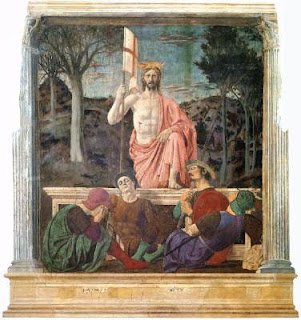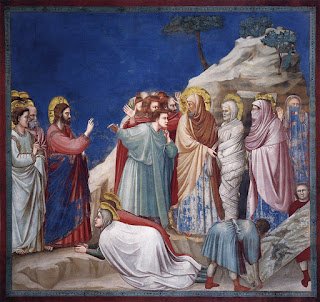PASCHAL JOY
Where the paschal blood is poured,
Death’s dread angel sheathes his sword;
Israel’s hosts triumphant go,
Through the wave that drowns the foe.
Christ the Lamb, whose blood was shed,
Paschal victim, Paschal bread!
With sincerity and love
Eat we manna from above.
The imagery refers here
to those crucial events of Israel’s Exodus that foreshadow and lead to the
freedom Christ brought to all humankind.
This
joy, like the peace that Jesus promised at the Last Supper to bestow on his
followers, whom he calls ‘friends’ because he conveyed to them all that he
heard from his Father, is beyond anything the world can offer or give: “Peace I
leave you; my peace I give you; not as the world gives… Theses things I tell
you that my joy may be in you and that your joy may be full” (Jn 14:27; 15:11).
This same joy is the Gaudia paschalia
of our Easter Greetings welcoming one another to enter fully into the spirit of
this new springtime of grace. Our faith restored, our hope invigorated, in
grateful love we rejoice since through Christ
Hell’s gloomy gates yield up their key,
Paradise door thrown wide we see;
Never-tiring be our choiring, alleluia.
(Ronald Knox’s translation of Simphonia
Sirenum [1695])
St Augustine pointed out that the worth and highest dignity of the whole
Christian life consists in being given by God a share in the freedom of heart, since
he who created us without our help will not save us without our cooperation and
response in love. This response finds best expression through a life of worship
in the joy of praising and giving thanks to God as his children. On numerous
occasions this zealous pastor expounded the significance of the Church’s joyous
song of praise of God, Alleluia, as
an incentive to rise above life’s commonly experienced frustrations. “In what
does your praise consist?” –he asks, and explains in a sermon commenting on Psalm
101: “It consists in believing that Christ is risen and in hoping that you will
rise through Christ. This is the praise of faith.” Christians, therefore, should
be an Alleluia from head to foot, that is, they are joyous praise-singers,
becoming the song they sing. The singing of Alleluia
during Eastertide, he says, awakens us from our drowsiness; it buoys us up
through the drudgery of our present condition; it stimulates and in a certain
sense already even satiates our longing for being at home with the Lord:
When the glory of Christ, now hidden from you, appears then you also
will appear with him in glory (cf. Col 3:4). Then Alleluia will be real, whereas now it is a matter of hope. Hope
sings it, love sings it now, love will sing it also then. But love sings it in
yearning now, then love will sing it in joy. (Sermon 255)
Quoting words
attributed to this greatest convert to Christianity, who was baptized on Easter
night 387, St John Paul II said in his address to a group of African Americans
at Harlem, New York, on 2 October 1979:
Are not Jesus’ words still true today? If we
are silent about the joy that comes from knowing Jesus, the very stones of our
cities will cry out! For we are an Easter people and “Alleluia” is our song.
With Saint Paul I exhort you: “Rejoice in the Lord always, I say it again,
rejoice” (Phil 4: 4).
This
quality of world-transforming Easter joy that Christians sing in Alleluias is truly the Word made
Eucharist, thankful praise of God for the wonderful work of his love in every
season of the year! It is rooted in our living faith in Christ Jesus being
alive, raised up by the Father’s love. Otherwise all existence would not only
be dull and drab, but also submerged in an empty outlook without perspective or
vision, bound to a future of doubt, uncertainty and fear. St Paul’s challenge
to the Corinthian Christian community remains true today to our
materialistic-minded times: “If Christ has not been raised, then our preaching
is in vain and your faith is in vain… your faith is futile and you are still in
your sins” (1 Cor 15:14, 17).
_____________________________





